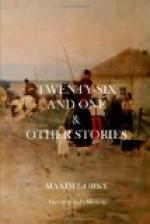“Oh, Lord, how much good it would do!” he sighed, sadly.
“Yes! I imagine that you’d very quickly board the train and—good-evening! Oh, how the girls would love you, yonder, in the village! You could have your pick. You could have a new house built. But for a new house, there might not be enough . . .”
“That’s true. A house, no; wood is very dear with us.”
“Never mind, you could have the one that you have repaired. Do you own a horse?”
“A horse? Yes, there’s one, but he’s very old!”
“Then a horse, a good horse! A cow . . . sheep . . . poultry . . . eh?”
“Why do you say that? If only! . . . Ah! Lord, how I might enjoy life.”
“Yes, brother, life under those circumstances would not be bad . . . I, too, I know a little about such things. I also have a nest belonging to me. My father was one of the richest peasants of his village.”
Tchelkache rowed slowly. The boat danced upon the waves which beat against its sides; it scarcely advanced over the somber sea, now disporting itself harder than ever. The two men dreamed, rocked upon the water and gazing vaguely around them. Tchelkache had spoken to Gavrilo of his village with the purpose of quieting him and helping him to recover from his emotion. He at first spoke with a sceptical smile hidden under his moustache, but as he talked and recalled the joys of country life, in regard to which he himself had long since been disabused, and that he had forgotten until this moment, he became carried away, and instead of talking to the lad, he began unconsciously to harangue:
“The essential part of the life of a peasant, brother, is liberty. You must be your own master. You own your house: it is not worth much, but it belongs to you. You possess a piece of ground, a little corner, perhaps, but it is yours. Your chickens, eggs, apples are yours. You are a king upon the earth. Then you must be methodical. . . As soon as you are up in the morning, you must go to work. In the spring it is one thing, in the summer another, in the autumn and winter still another. From wherever you may be you always return to your home. There is warmth, rest! . . . You are a king, are you not?”
Tchelkache had waxed enthusiastic over this long enumeration of the privileges and rights of the peasant, forgetting only to speak of his duties.
Gavrilo looked at him with curiosity, and was also aroused to enthusiasm. He had already had time in the course of this conversation to forget with whom he was dealing; he saw before him only a peasant like himself, attached to the earth by labor, by several generations of laborers, by memories of childhood, but who had voluntarily withdrawn from it and its cares and who was now suffering the punishment of his ill-advised act.
“Yes, comrade, that’s true! Oh! how true that is! See now, take your case, for instance: what are you now, without land? Ah! friend, the earth is like a mother: one doesn’t forget it long.”




